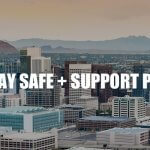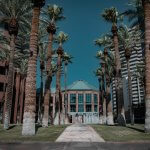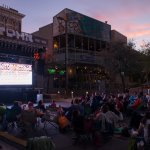I love downtown Phoenix. I love the people, I love the atmosphere and I love that it has so much potential.
What I don’t get, and probably never will, is why there is so, so much focus on restaurants and retail.
Restaurants attract tourists. Retail attracts shoppers. Both pay low wages. Neither serves residents.
Ever been to downtown Phoenix? Restaurants, save for one shining star, are usually half full. During the summer, many of them are closed for weeks at a time. Since so few people live here, mainly due to the fact there’s nothing to keep them here, the only busy nights are Fridays. Sure, First Friday is fantastic, but that’s once a month.
I want downtown Phoenix to succeed just as much as you do. I want an AJ’s in CityScape, I want the Public Market open more often and I want things to do after 11pm, but I realize that takes time and that takes people. I want more than just retail. I want more than just corporations. I want variety.
So please, please, let’s be realistic about all this. Downtown Phoenix isn’t booming, it’s growing. Hell, the last time I heard downtown Phoenix was booming we got a bunch of high-end, high-priced condos that still aren’t full that few people can afford to rent.
Stop saying revitalization. Downtown Phoenix doesn’t have much history to build on. Stop living in the past. Look toward the future.
Let’s develop, but let’s be sure to do it sustainably. The last thing we need down here is another collapse.







Retail and restaurants don’t serve residents? That statement doesn’t make sense to me. When I used to live Downtown, I often found myself headed over to Scottsdale or the Biltmore area for good meals. Now, Downtown residents can walk to places like Sens, PastaBAR, etc. If were to live Downtown again, I’d be eating near home a lot more than I did all those years ago. Even now that I’m a Downtown enthusiast rather than a Downtown resident, I still prefer being able to eat well in the core of my city rather than feeling I have to head to a suburb. My visits Downtown helps create foot traffic that makes Downtown a more lively place. My spending Downtown helps support businesses that make the area more attractive to potential new residents. As I wrote in a Yelp review earlier today, “current trends seem to be moving the dining crossroads of the metro area to where it always should have been: the center of the region’s core city (as opposed to its reluctant suburb to the east).” I agree that speculative development is bad, but I don’t see the current crop of Downtown restaurants in that category. Most are the product of hard-working entrepreneurs who have built up a solid fan base over the years. One of the unexpected benefits of Downtown Phoenix’s underdog status is that it has been largely bypassed by chains. Instead, Downtown residents and visitors alike get an expanding mix of indie restaurants. I can’t see the negative in that.
When the vast majority of business is restaurants, that’s not very helpful. Downtown needs far more things to do than just go out and eat. Right now our options are sports and food. Not much else.
So what do you suggest then?
More housing. More things to do. More shade.
Your point that we are not in a boom is quite accurate. It is assuredly not booming downtown. It’s growing slowly. The businesses that exist now, are simply the types of businesses that can potentially sustain viability, given the number of residents in the area, and the type of traffic the area currently gets (primarily tourist/sports). Whenever it is that more people live downtown, will be whenever it is that a greater variety of businesses exist, because that diversity can only come from the residences of downtown and their personal needs.
That’s the basics of business/real estate. Business FOLLOWS residential. It never leads it. You see that in any developing neighborhood through Phoenix. First the houses go up. Then the grocery store is built. Then the Subway/Starbucks arrives. But FIRST the houses go up. Downtown still needs a lot more housing units to justify the diversity that you crave.
The idea that business follows residential is generally true. What makes Phoenix somewhat unique in this sense is that there is already so much unfilled housing (as Tyler mentioned in his first post) that there is a break in the business/residential cycle. Yes, the housing consists largely of pricey condos. But in order to fill those condos, there needs to be some incentive for people to occupy them. And since the people who are going to occupy them have to be relatively well-off, that incentive is probably going to consist of things like new restaurants and shops.